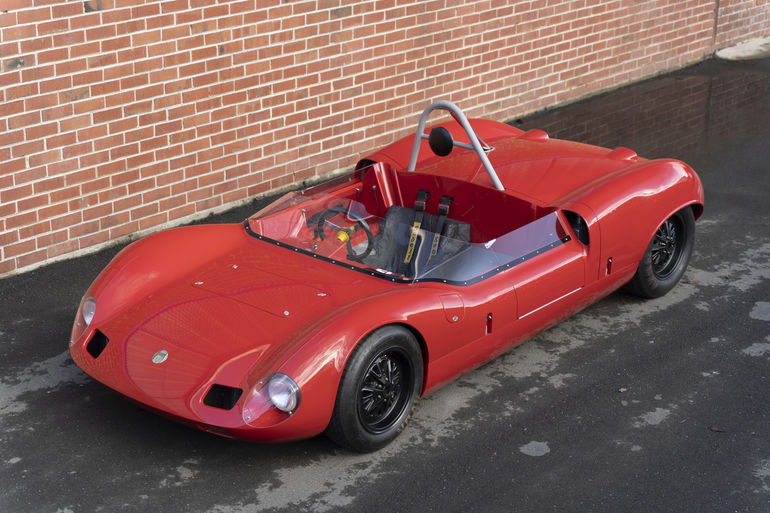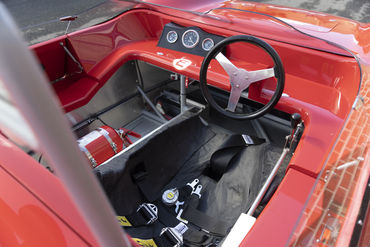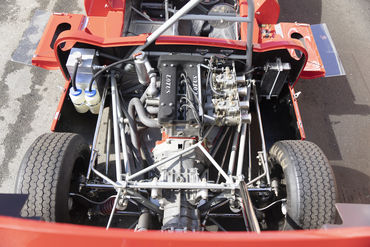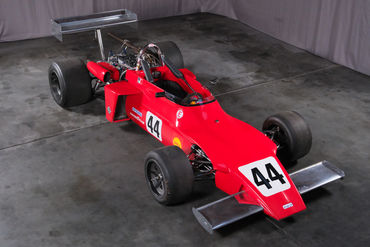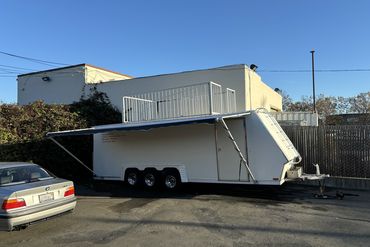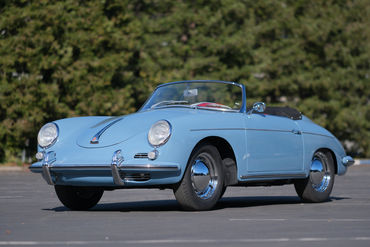Sold
SOLD 12/21
1963 Elva
Mk. 7
Zero time on chassis-up restoration to impeccable standards. Accompanied by original chassis and well-suited for competition in a variety of high-level events both in the USA and abroad!
- VIN70022
- Exterior ColorRed
- Interior ColorBlack
- MileageTMU
- Engine1.6L Lotus Twin Cam Inline Four
- TransmissionHewland 5-speed manual transaxle
- StatusSold
- StockFJ2539
Description
1963 Elva Mk 7 Sports Racer
s/n 70022
Red with black interior
Launched in 1954 by Frank Nichols, the very first Elva returned to the pits after the inaugural test drive driven by a Frenchman. Upon arriving, Nichols asked how the car was and the Frenchman replied in “Elle Va” (she goes), thus earning the name. In a few short years, Elva would become one of the most competitive lightweight race cars earning significant wins during motorsports glory years of the 50s and 60s. Racing head-to-head with the likes of Lotus, Lola, Marcos, Peerless, and Turner, Elva Engineering factory teams and privateers proved the value of the lightweight design and impressive power to weight ratio. Powered by a range of engines from the early side-valve Ford, to sports-racers powered by Porsche and BMW engines, and to the big V8 McLaren-Elva CanAm cars, the lightweight Elva MK series with its space-frame chassis, independent suspension, and reliable power plants were favorites among racers that demanded the latest in technological advancements.
Although the earlier series cars were formidable, the Mk VII would prove to be one of the most visually striking cars in part due to the impossibly low profile, minimal frontal cross section, and “lay down” design that delivered shotgun-like acceleration and slot-car cornering. The Mk VII was so successful that the Eric Marsden design, incorporating a tight engine/gearbox unit, disc brakes, and lightweight suspension, was able to handily challenge all contenders including the innovative Lotus 23. And while race cars of this period were frequently altered, enhanced, or modified to suit newer technology as seasons progressed, the Mk VII remained highly competitive well into the late 1960s.
This Elva Mk VII, chassis 70022 was originally delivered to Carl Haas powered by a Ford 1150 engine and 5-speed Mk VI gearbox. The car is believed to have been delivered new to North America, painted red. On or around 1968, the car was purchased and raced by the late Richard Scott, who went on to be the founder of Red Line Racing, Pittsburg, PA. According to correspondences from Lee Chapman Racing, chassis 70022 is a genuine and original car which was previously restored by Clen Taylor, Stratford, CT. Previous owners include Hamish Summerfield and Joe Blacker, both of whom successfully raced the car on the East coast. Logbooks from 1997-2008 indicate many successful outings including both Class and Overall wins in 2008 for the Elva 50th Anniversary at Sebring. History of the car includes several vintage races under prior ownership including events at Road America, Mid-Ohio, and Watkins Glenn.
The current owner purchased this car in 2010 and shortly thereafter began a ground up restoration, engaging a series of expert racing professionals spanning several years to complete. During the restoration, the car was completely disassembled, and the original chassis evaluated for further race use. The owner determined the safest course of action would be to have a Pat Prince chassis constructed to original specifications using original dimensions and modern materials including improved suspension anchor points with specific geometries worked out for maximum performance. The frame construction also included the addition of a formula-style roll hoop with rear stay. Most importantly, the original frame is complete and included with the car as part of the sale.
Expert engine builders at Marcovicci-Wenz Engineering built the alloy block Ford-Lotus 1600 twin-cam engine which was assembled to absolutely the best specifications including an English steel crankshaft, Carrillo BDA rods, JE 13.2:1 pistons, and a replacement dry sump oil pump. Included in that build was a Richardson head with reengineered valves, new bearings, and carefully spec’d internals. When completed in 2008, the engine put out an astonishing 200+ hp. In 2012, after five race weekends, the engine was disassembled, inspected, resealed, and dyno tested by Ivey Engines, Inc, Portland, OR with output rated at 173hp at 7,500 rpm as indicated on the dyno sheets accompanying the car. The car has not competitively run since this work was performed.
In addition to the comprehensive mechanical work, a new set of Curtis Unlimited fiberglass body panels were purchased, test fit, prepped, and professionally finished in red just as it left the factory when new. In addition to the all-new frame construction, new alloy panels, new alloy radiators, new nickel-plated suspension, new rotors, new uprights, new stub axles, and a rebuilt steering rack were also installed. A Mk V Hewland gearbox with Mk IX upgrade was rebuilt by Taylor Race Engineering in 2007 including a new outer case, ring and pinion, and all new bearings. The gearbox was disassembled and inspected in 2008 by Wehrman Engineering, with very few hours recorded since reassembly.
Today this historically important Elva Mk VII is presented in excellent condition, properly prepared for vintage racing, featuring cosmetics and race preparation consistent with top-level preparation. Having logged no miles since the restoration was completed, the current cosmetic condition is excellent overall showing only modest evidence of use. The beautifully shaped spider body has fit and finish far beyond most vintage race cars including exceptional attention to detail in panel fit, windshield fit, and smooth operation when raising the body sections or lowering the hinged doors to reveal the frame and mechanical features. The clean and purposeful open cockpit body is beautifully formed around the impossibly low-profile frame, most of which sits below the knees of an average height standing person. The paintwork is glossy throughout with alloy latches, Elva emblem, and contoured plexiglass headlight covers accenting the impressive body panels. The Elva 5.0/22.0-13” front and 6.5/23-13” rear cast wheels are uniquely designed and appropriately shod with a set of Avon tires, tucked perfectly beneath the smoothly contoured aerodynamic body. Exterior details while sparse are in excellent condition including lighting, perimeter low profile plexiglass windscreen, wrap around side windows, and taillights, all of which are appropriate competition touches to the overall design.
The cockpit is simple, clean, and very well laid out featuring a low-profile contoured driver’s seat bucket, Sabelt seat harness, and padded headrest mounted to the triangulated roll bar. The seat is flanked by a fire suppression bottle (2018 manufacture date) and the lower portion outfitted with exposed alloy pans. Three black dial instruments with chrome bezels make up the black binnacle nested in the formed dash panel. Drop down hinged doors make for easy entrance and exit, and when closed into position, the car feels very much like you wear it, enclosing the driver in a purposeful, compact, and extremely capable package.
The rear section is easily hinged open revealing the beautifully detailed engine, dual 45 DCOE twin throat Weber carburetors, tuned exhaust, and a professionally prepared engine bay. The exposed mechanicals of the rear section show the Hewland transmission, suspension, detailed lines, thoughtful preparation, and up to date materials, fittings, and lines. Under the front hinged body section, further component details are revealed including the painted grey frame tubes, foot pedals, front suspension, and carefully plumbed water lines. Although this Elva has been expertly restored and prepared for future competition events, we recommend a professional race shop review all mechanical systems, fluids, and safety equipment installed on the car and perform road testing before using this car in a competition setting.
This car is accompanied by the original frame, a case of gears, a spare mirror, the larger diameter original Elva steering wheel, racing logbooks dating back to 1997, 8 spare Elva wheels (2-7”, 2-9”, 4-8”), and numerous correspondences on the history and ownership, as well as restoration records outlining the engine and chassis work (both from previous and current owners) with the most recent work having been performed in 2019.
This is a fantastic opportunity to acquire an historically correct, beautifully restored, and documented Elva Mk VII ready for premier historic racing events.
The above vehicle information is complete and accurate to the best of our knowledge at the time it is posted to this website. Corrections or additional information is always appreciated. All advertised prices exclude government fees and taxes, any finance charges, any dealer document preparation charge, and any emission testing charge. Vehicles are subject to prior sale. All advertised to be true but not guaranteed. We assume no liability for errors or omissions.
Inquire About This Car
Fantasy Junction • 510-653-7555 • 1145 Park Ave, Emeryville, CA 94608
